 Petzlover
Petzlover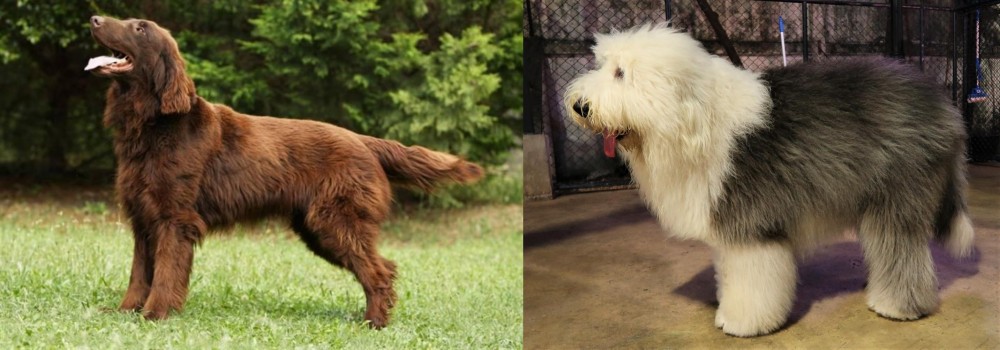 Both Flat-Coated Retriever and Old English Sheepdog are originated from United Kingdom. Both Flat-Coated Retriever and Old English Sheepdog are having almost same height. Flat-Coated Retriever may weigh 9 kg / 19 pounds lesser than Old English Sheepdog. Both Flat-Coated Retriever and Old English Sheepdog has almost same life span. Both Flat-Coated Retriever and Old English Sheepdog has almost same litter size. Both Flat-Coated Retriever and Old English Sheepdog requires Moderate Maintenance.
Both Flat-Coated Retriever and Old English Sheepdog are originated from United Kingdom. Both Flat-Coated Retriever and Old English Sheepdog are having almost same height. Flat-Coated Retriever may weigh 9 kg / 19 pounds lesser than Old English Sheepdog. Both Flat-Coated Retriever and Old English Sheepdog has almost same life span. Both Flat-Coated Retriever and Old English Sheepdog has almost same litter size. Both Flat-Coated Retriever and Old English Sheepdog requires Moderate Maintenance.
 The Flat-Coated Retriever traces its heritage to 19th century England. A popular gamekeepers’ dog, the actual descendants of the breed are not entirely known. Like so many well-established breeds, there are many lines of thought about the breed line. There is an unverified line of ancestry that includes the St. Johns Water Dog – an extinct breed from North America. Another story has Canadian sailors bringing their Newfoundlands to England and mixing them with Colliers and Setters. This story has more truth to it and it took 20 years to establish the final breed type.
The Flat-Coated Retriever traces its heritage to 19th century England. A popular gamekeepers’ dog, the actual descendants of the breed are not entirely known. Like so many well-established breeds, there are many lines of thought about the breed line. There is an unverified line of ancestry that includes the St. Johns Water Dog – an extinct breed from North America. Another story has Canadian sailors bringing their Newfoundlands to England and mixing them with Colliers and Setters. This story has more truth to it and it took 20 years to establish the final breed type.
The breed was originally a retriever with two purposes – to retrieve the hunters’ bounty on land and on water.
The Flat-Coated Retriever was then introduced to the United States as a gun dog. By 1873 it was a “stable type” and in 1915 the AKC recognized the breed. After this, their popularity grew quickly until the American public fell in love with the Golden Retriever and the Labrador Retriever. Then the Flat-Coated Retriever’s numbers and popularity fell. The irony was that both the Golden and the Labrador credited the Flat-Coated Retriever as an ancestor. The survival of the breed was questionable following World War Two. They were brought back by a specific breeding program in the 1960’s.
Breeders in the ‘60s made sure they bred for both show dogs and companion animals. The Flat-Coated Retriever survived and is less popular than other retrievers, but he has his fans. The breed is more popular in the United Kingdom than it is in the United States in part because of Best in Show wins at Crufts
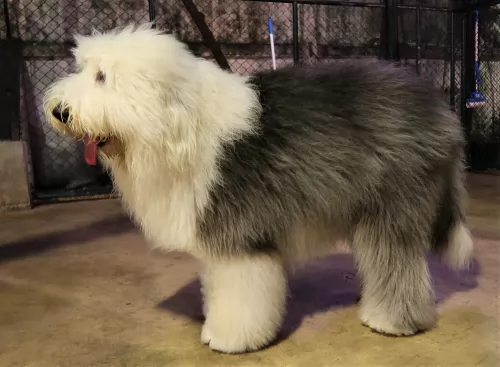 The origin of the Old English Sheepdog is unclear as records weren’t kept. However there are some aspects that suggest the dog originated in the 19th century and that the Scottish Bearded Collie had a significant part in the development of this dog which hails from England.
The origin of the Old English Sheepdog is unclear as records weren’t kept. However there are some aspects that suggest the dog originated in the 19th century and that the Scottish Bearded Collie had a significant part in the development of this dog which hails from England.
It is also believed that the Russian Owtchar was involved in the development of the Old English Sheepdog. The dog was recognized by the American Kennel Club in 1888. In 1904, the Old English Sheepdog Club of America was also founded.
The shape of the dog has changed very little over the years and it was in the 1880s that the dog was exported to the United States.
 The Flat-Coated Retriever has a straight and strong topline with unique head, strong jaws, a long muzzle and small ears. His eyes are dark brown almonds with a friendly and intelligent expression. He has an arched neck and a moderately long tail. The Flat-Coated Retriever is more of an athlete, lighter and certainly more elegant than any other type or breed of retriever.
The Flat-Coated Retriever has a straight and strong topline with unique head, strong jaws, a long muzzle and small ears. His eyes are dark brown almonds with a friendly and intelligent expression. He has an arched neck and a moderately long tail. The Flat-Coated Retriever is more of an athlete, lighter and certainly more elegant than any other type or breed of retriever.
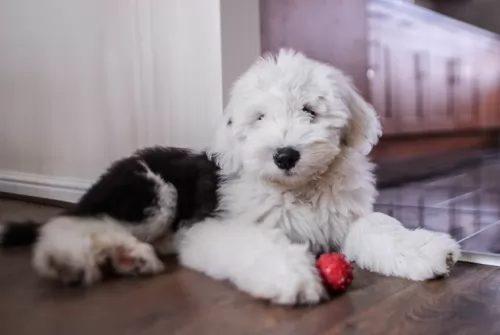 The Old English Sheepdog is a large dog standing at between 50 and 60cm and weighing between 27 and 45kg.
The Old English Sheepdog is a large dog standing at between 50 and 60cm and weighing between 27 and 45kg.
He is muscular with a broad bottom and hip area. The head is also large and the small ears are carried flat. The tail has always been docked, giving the dog a large panda-bear look to him, but these days the tail is often left long, and the dog loses that square compact look.
When the tail is left long it is well feathered. The coat can become fairly long and is quite harsh and wavy to straight. The coat is essentially grey with white hair over the head area. The puppies are born with their hair being black and white, and later on the traditional grey coloring comes in.
What is quite interesting with this dog is that it stands lower at the shoulder than at the loins, so just like a Panda bear, he also lopes or walks in a bear-like fashion.
The Old English Sheepdog isn’t an aggressive dog. He is social, intelligent and entertaining for his human family, whom he loves to spend time with.
He is an energetic dog too and he would prefer a country setting where there are large fields to run in as opposed to living on a tiny property in the city. He is an adaptable dog though, and will slot into life in the city or suburbs, so long as he is well exercised.
Train him and socialize him and he will become an obedient, amicable pet to have around.
 The Flat-Coated Retriever is great with children. Just be careful they don’t knock over small children in their enthusiasm.
The Flat-Coated Retriever is great with children. Just be careful they don’t knock over small children in their enthusiasm.
They are confident great family dogs. They are “thinking dogs” and need something to work for or they will work for themselves. They can be clowns.
They are adaptable although their size might preclude small locations without yards.
Smart, thinking all the time, they are very trainable. However, they are considered the “Peter Pan” of dogs – they never grow up.
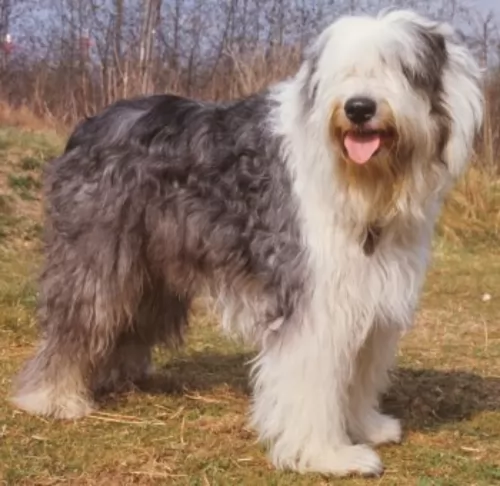 The Old English Sheepdog is the ideal dog for a family pet. They love spending time with their human family and are affectionate and loyal, getting on well with children as well as other pets.
The Old English Sheepdog is the ideal dog for a family pet. They love spending time with their human family and are affectionate and loyal, getting on well with children as well as other pets.
From the time he is a puppy, you can see that he is fun-loving and easy going while also being intelligent. He is also a guardian and wants to protect his human family.
Provide him with the opportunity to get out into the country sometimes if you don’t live on a farm because he is essentially a farm dog. He used to be a herding dog and likes to be busy. Treat him well and have him trained and socialized and he’ll make you a superb pet.
 Flat-Coated Retrievers have their share of health concerns from dysplasia to cancer. The breeds problems include:
Flat-Coated Retrievers have their share of health concerns from dysplasia to cancer. The breeds problems include:
Hemangiosarcoma, Osteosarcoma, Malignant Histiocytosis, and Fibrosarcoma. Studies show that about half of all Flat-Coated Retrievers die of cancer.
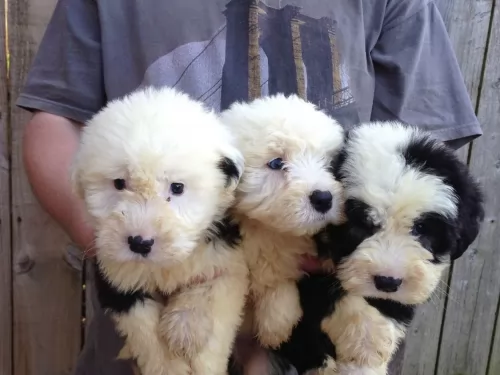 It is estimated that the beautiful Old English Sheepdog can live to be about 10, 11 or 12 years of age if he is looked after well. Just like with other dog breeds though, this particular dog is also prone to some of the common dog diseases there are.
It is estimated that the beautiful Old English Sheepdog can live to be about 10, 11 or 12 years of age if he is looked after well. Just like with other dog breeds though, this particular dog is also prone to some of the common dog diseases there are.
Some of these diseases include hip dysplasia, diabetes, eye diseases and deafness along with some skin problems.
As a chronic disease, Diabetes can affect dogs as well as other animals and humans. Diabetes in dogs can’t be cured but it can be managed, with Diabetes Mellitus being the kind of diabetes most seen in dogs. Whatever kind of diabetes your pet has, the negative effects remain the same.
It can be devastating when your dog has been with you for about 10 years, to discover that he has cancer. Of course, cancer is the leading cause of death found in dogs older than the age of 10.
Many cancers are curable if you catch them early. Malignant lymphoma is a common cancer with dogs but there are other cancers too. The warning signs of cancer in dogs are much the same as what you get with humans. You’ll discover a lump or even an injury that won’t heal. There could also be abnormal bleeding.
There are many different kinds of skin problems seen in dogs, some of which are more common than others. You’ll notice your dog licking a part of the body so that the hair disappears and the skin becomes exposed.
There are skin problems started because of inadequate diet and lack of nutrition. There are plenty of commercially manufactured pet foods that don’t have the right amount of vitamins and minerals your pet needs. Always buy a good quality one to fight these very aggravating skin allergies. A vet may give hydrocortisone products but many dog owners these days try to treat their dogs with natural products.
 He will be a medium size dog. Feed puppies 3-4 times a day about a 1/8 cup of high-quality food. Feed a puppy food designed for medium size dogs or specifically for retrievers.
He will be a medium size dog. Feed puppies 3-4 times a day about a 1/8 cup of high-quality food. Feed a puppy food designed for medium size dogs or specifically for retrievers.
Feed 2 times a day about !/2 cups of dry food per meal. Do not overfeed. They have a tendency to be obese.
Maintain a healthy weight and avoid exercise before and after meals. The good news is dysplasia and epilepsy are rare in the breed.
They are very energetic and need good exercise. Long walks and a yard to run in. Remember they are hunting dogs and will chase to retrieve things so don’t let them off leash outside your yard. They will excel at agility, tracking. Rally, obedience, swimming, hunting, and jogging. They make great therapy dogs.
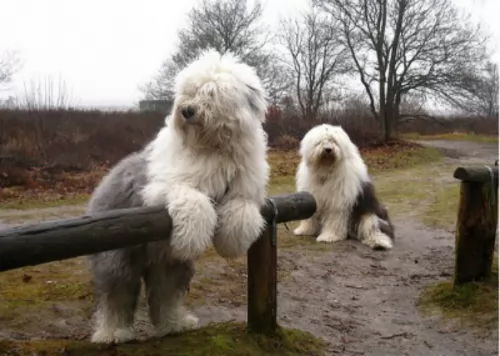 Food allergies are caused by your dog eating food with ‘bad’ ingredients which don’t agree with him. Make sure your pet has a wholesome diet.
Food allergies are caused by your dog eating food with ‘bad’ ingredients which don’t agree with him. Make sure your pet has a wholesome diet.
Invest in the very best quality commercially manufactured food. Home-made food is always a wonderful treat for any dog but it needs to be kept simple. No exotic, spicy foods and no suddenly changing your pet’s diet.
Simple, nutritional boiled chicken, brown rice or pasta and vegetables such as sweet potato, carrots and spinach added into his kibble as a treat will do wonders for your pet and he will thank you for keeping his meals tasty and simple. A little bit of raw meat added in occasionally can also do him the world of good. Fresh, cool water must always be available.
The Old English Sheepdog is quite a high maintenance dog, what with that long hair and all, and some owners of this dog prefer to take him to the parlor to have the hair sheared and wash, otherwise it could become a mammoth task for a dog owner.
If you opt to keep the hair long, you may end up having to be constantly brushing your pet’s coat to prevent it tangling. Not only that, if you live in a hot area, cutting the hair can help towards keeping the dog cool.
The ears of your dog should be checked regularly for infection as well as the eyes, and keep the nails clipped as well.